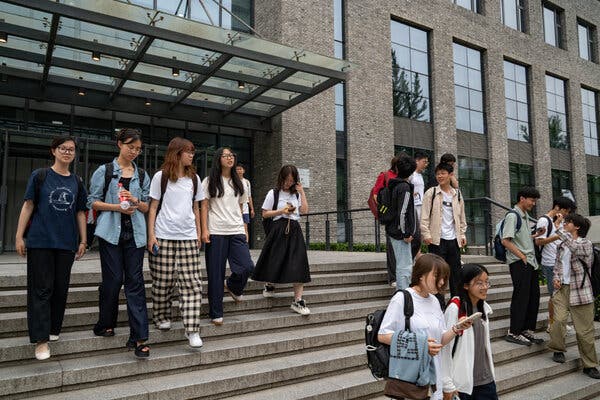The Chinese government recently introduced a new visa aimed at attracting young scientists and technology experts from around the world. This initiative, effective from October 1, 2023, is seen as a strategic move to position China as a leading global scientific power. However, the response from the public has been overwhelmingly negative, with many citizens expressing concerns that this policy could lead to increased competition for jobs amid a challenging employment landscape for young people in China.
Social media platforms have been flooded with criticism since the announcement. Many commenters argue that inviting foreign talent is a misguided strategy that threatens the job market for Chinese youth. The situation escalated when prominent figures, such as Henry Huiyao Wang, president of the Center for China and Globalization, praised the visa initiative. Wang faced a public backlash, with some users labeling him a “race traitor,” leading to widespread sharing of negative sentiments online.
The backlash intensified following reports from Indian media that suggested the Chinese visa could serve as an alternative to the popular H1-B visa in the United States, which has recently seen increased fees. This has resulted in a surge of xenophobic and nationalist sentiments, particularly directed toward Indian nationals. The People’s Daily, the official newspaper of the Chinese Communist Party, responded to the criticism by calling it “outlandish” and accusing detractors of misleading the public about the visa’s intent.
In defense of the new policy, Hu Xijin, former editor-in-chief of the nationalist tabloid Global Times, stated that the perception of foreigners in China is skewed. He noted, “To be honest, it’s not that there are too many foreigners coming to China right now, but rather that there aren’t enough.” Despite these reassurances, the public outcry highlights the challenges China may face in attracting top scientific talent, especially as anti-foreign sentiment has grown in recent years.
China’s historical context reveals a low level of inbound immigration, compounded by numerous cultural and legal hurdles for foreigners wishing to stay long-term. In previous attempts to relax residency requirements, such as in 2020, the government retreated in the face of similar public opposition. Reports indicate that China granted fewer than 5,000 permanent residency cards between 2004 and 2014, underscoring the difficulties foreigners encounter in seeking long-term residency.
The People’s Daily editorial emphasized that while the new visa aims to simplify entry for young scientists, it “cannot be equated with immigration.” Furthermore, the specific eligibility criteria for the visa remain unclear, despite the imminent launch date. So far, officials have only disclosed that applicants must possess a bachelor’s degree in science, technology, engineering, or mathematics from a top university.
The employment landscape for young people in China has been under significant pressure, particularly as the government grapples with slowing economic growth. Recent statistics revealed a record high in youth unemployment, raising concerns about job availability across various sectors. Xi Jinping, China’s leader, has previously identified employment stability as crucial for preventing social unrest.
Public sentiment reflects the frustration felt by many young job seekers. A popular manga author, known by the pen name Feng Xi Shen Lei, voiced concerns on social media, stating, “Given the talent pool in China, I don’t believe that there’s any position in any field that must be filled by a foreigner.” Critics have also targeted the visa requirement of only needing a bachelor’s degree, arguing that for many, advanced degrees have become essential to secure employment.
The disconnect in the job market is evident, as many recent graduates are struggling to find roles in traditional sectors like real estate and education, which are currently facing downturns. Conversely, industries such as advanced manufacturing and artificial intelligence are in urgent need of qualified professionals, with the Ministry of Education estimating a shortfall of tens of millions of candidates.
Denis Simon, former executive vice chancellor of Duke Kunshan University, advocates for increased scientific collaboration between the United States and China. He suggested that greater transparency regarding the visa application process could alleviate some public concerns. Nevertheless, he acknowledged that Beijing’s actions are designed to attract more foreign expertise as part of broader reforms aimed at enhancing the country’s talent pool.
As China continues to navigate the complex dynamics of its job market and foreign relations, the success of this new visa initiative remains uncertain. The significant public response indicates that any efforts to bring in foreign talent may require careful management and communication to overcome nationalistic sentiments and ensure mutual benefits for both foreign professionals and the local workforce.







































































